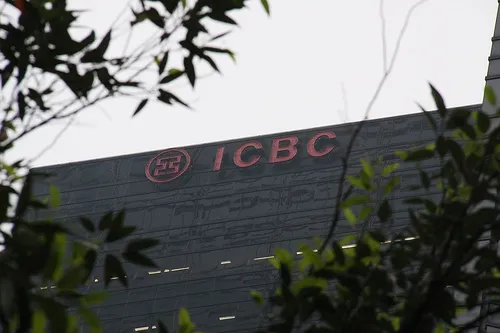
3 key takeaways from ICBC's analyst briefing revealed
NIM compression will bottom out in 2Q13.
According to Barclays, ICBC reported 1Q13 net profit of RMB68.7bn, (2% higher than our forecast and 6% ahead of Bloomberg consensus), up 12% y/y. The better than expected fee income was offset by higher provisions.
Here's more from Barclays:
Key positives, in our view, include: 1) better than expected 1Q13 NIM of 2.59% (-4bps q/q); 2) net fee income rose 19% y/y or 30% q/q in 1Q13; 3) cost to income ratio improved further to 31% in 1Q13, a record quarterly low; and 4) resilient Tier 1 ratio of 11% (+38bps q/q), under new capital rules. The bank’s NPL amount went up modestly by 7.6% in 1Q13 and NPL ratio rose 2bps.
Our key takeaways from the analyst briefing include: 1) the mild sequential NIM compression will bottom out in 2Q13, as 98%/ 97% of its loans and deposits will finish repricing by end-June, and ICBC targets to maintain a stable NIM onwards;
2) non-standard credit assets (NSCA) account for 35% of the bank’s WMP outstanding balance; 3) asset quality stable, only 14% of provision made in 1Q13 was individual-based.
Small contraction of 4bps in 1Q13 sequential NIM: Under our calculation, ICBC’s sequential NIM recorded a slight compression of 4bps to 2.59% in 1Q13, mainly attributable to continued loan repricing, in our view.
85% of loans had finished repricing as of end-1Q13 (vs. 50% at end-2012), according to the management. Loan pricing power remained solid, with 6.7% of outstanding loan amount priced above the benchmark rate as of end-1Q13.
Loan yield was 5.93% in 1Q13 (vs. 6.12% in 2H12), where domestic corporate loan yield was 6.11% (vs. 6.43% in 2H12), domestic personal loan yield was 5.67% (vs. 6% in 2H12), and discounted bill rate was 6.79% (vs. 6.07% in 2H12).
The bank estimates that 98% of loans and 97% of deposits will finish repricing by end-1H13, therefore its NIM is likely to post another small decline in 2Q13. The bank is confident that its NIM will be maintained at a stable level in 2H13, supported by ICBC’s loan mix optimization strategy and its larger portion of cheap demand deposits (50% of its domestic deposits were demand deposits at end-1Q13).
Steady balance sheet growth in 1Q13: Total loans grew by 5.2% q/q in 1Q13, led by corporate loans (+5.9%) and personal loans (+5.3%), despite a 17.6% q/q drop in discounted bills. However, its domestic RMB loans only grew by 3.2% in 1Q13. Total deposits were up 5.4% in 1Q13, pushing LDR ratio slightly down by 0.1ppt to 64.4% at end-March.
Strong fee income growth: Net fee income grew significantly by 19% y/y or 30% q/q to RMB34.2bn in 1Q13, driven by strong fees from investment banking business (+14% y/y and accounted for 25% of total fees in 1Q13), settlement and cash management, and credit card business. This year, ICBC continued to enhance POS machine installment and card issuance; both credit card consumption volume and credit card loans grew by over 30% y/y in 1Q13.
NSCA of WMPs at 35% of outstanding balance: The bank’s total outstanding balance of WMPs was RMB1,087.7bn at end-1Q13 (+8.2% in 1Q13 from RMB 1,005bn at end-2012), comprising 12% principal guaranteed (RMB133.2bn), and 88% non-principal guaranteed (RMB954.5bn).
Over 99.9% of the principal guaranteed WMP and more than 65% of the non-principal guaranteed WMP were of duration less than one year. Non-standard credit assets (NSCA) accounted for around 35% of the WMP outstanding balance now, which comply with CBRC’s requirement. The No. 8 documents released in late March has very limited impact on ICBC, according to the bank.
Asset quality largely stable: The bank’s NPL amount grew by 7.6% and NPL ratio was up by 2bps to 0.87% at end-1Q13. According to the management, special mentioned loan amount was RMB232.9bn, accounted for 2.51% of total loans (down 7bps from 2.58% at end-2012).
According to the management, overdue loans over 1-30 days, 31-90 days and 91-365 days as % of total loans were all only up by 3-4bps in 1Q13, where overdue loans over 1 year as % of total loans was stable. We estimate that 1-90 days overdue loan amount went up by 10% in 1Q13 to RMB70.1bn (0.76% of total loans), and >90days overdue loans up +17.2% to RMB72.7bn (0.79% of total loans).
Prudent credit cost in 1Q13: The credit cost of 55bps in 1Q13 was higher than that in 1Q12 (51bps), as the bank enhanced the counter-cyclical management. According to the management, 86% of the provision was collective-based, and only 14% was individual-based. The bank targets to maintain a stable provision coverage ratio at current level of around 290%.
Resilient capital position; new capital rules lifted Tier-1 ratio by 16bps: The bank’s Tier-1 ratio and total CAR improved by 22bps/11bps q/q to 10.84% and 13.77%, respectively, at end-1Q13. Similar to the bank’s previous estimation, the new capital rules further lifted its Tier-1 ratio by 16bps to 11%, but lowered its total CAR by 9bps to 13.68% at end-1Q13.













 Advertise
Advertise










